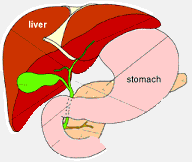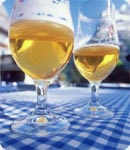The liver is a vital organ for metabolism and detoxification. Toxins and bacteria absorbed from the intestine may reach the liver directly and produce injury. Dietary deficiencies have been shown not only to produce certain damages in the liver but also to make the organ more susceptible to the injurious effects of infections and toxins. If the protein intake is low fatty changes are seen in the liver. This is also seen if the diet has a very high proportion of fatty foods or carbohydrate foods. However these changes can be easily reversed when the diet is corrected. Viruses like Hepatitis A or Hepatitis B are seen to cause liver damage. Certain drugs if consumed frequently may cause
damage. Workers in chemical industries may see their livers affected and excess stores of iron, copper etc. accumulating in the liver
may also lead to cirrhosis  However the most commonly seen problem of the liver is damage caused by excess consumption of alcohol. In malnourished patients consumption of alcohol produces acute liver damages and jaundice that resembles viral Hepatitis. Alcohol is also known to have direct action on the fat or lipid metabolism in the liver by 1. Increasing fatty acid synthesis 2. Decreasing fatty acid oxidation and 3. Specifically stimulating triglyceride formation (heart patients who have raised triglyceride would be wise to completely avoid alcohol). However the most commonly seen problem of the liver is damage caused by excess consumption of alcohol. In malnourished patients consumption of alcohol produces acute liver damages and jaundice that resembles viral Hepatitis. Alcohol is also known to have direct action on the fat or lipid metabolism in the liver by 1. Increasing fatty acid synthesis 2. Decreasing fatty acid oxidation and 3. Specifically stimulating triglyceride formation (heart patients who have raised triglyceride would be wise to completely avoid alcohol).
Cirrhosis is a condition in which liver cells are destroyed and it is a serious and irreversible disease. The cirrhotic process may commence many years before it becomes clinically obvious. However some of the symptoms are lack of appetite, nausea, vomiting, pain and distention. The patient may also suffer from weakness, muscle cramps, weight loss and fever. As the disease progresses jaundice and other serious changes occur.
The one most causative factor is a daily consumption of alcohol along with a poor intake of protein and carbohydrate foods and vitamins. Alcohol is also known to have a direct action on the lipid metabolism in the liver, which stimulates triglyceride formation, which is very dangerous for those with a tendency for coronary heart disease. Today the media has a lot of information promoting the consumption of alcohol saying it has various beneficial effects in the treatment of heart disease and hypertension. I would like to say if you are a teatotaler please continue to be that way. If you are a drinker be very, very careful and controlled in your drinking as the dangers of alcohol are too many, specially for your liver. One point I want to make is that consumption of alcohol is not a necessity for treating heart disease. Hundreds of heart patients are recovering perfectly well without consuming alcohol regularly. Also alcohol is one of the things that can be highly addictive so those consuming it must be
very cautious as to whether you are in control of its consumption and have the capacity to stop when you choose. Most often you start
with all good intention to consume only one or two drinks and then the alcohol takes control and you go on.
 Alcohol has too many negative properties from the health point of view. Most drinks are equally high in calorie value. 1 glass wine (100ml) equals 120 calories or 6 teaspoons sugar, 1 mug beer (300ml) 130 calories is, 6-7 teaspoons sugar, any hard liquor, all of them are about 140-150 calories or 7 teaspoons sugar per large drink. Alcohol has too many negative properties from the health point of view. Most drinks are equally high in calorie value. 1 glass wine (100ml) equals 120 calories or 6 teaspoons sugar, 1 mug beer (300ml) 130 calories is, 6-7 teaspoons sugar, any hard liquor, all of them are about 140-150 calories or 7 teaspoons sugar per large drink.
This causes rapid gains in weight, shooting up of blood sugar levels, rising of triglyceride levels, endangering the heart and of course finally damaging the liver. Please note alcohol is in no way a necessity to the body. There is no nutritional benefit from the consumption of alcohol. It has no nutrient that is essential to anybodies diet, at any age or stage in life.
Down the ages it has only caused more harm then good and anybody who can give it up completely will only benefit from that. However those who must drink and feel they would rather drink it in moderation, I would advice that it should be restricted to 2 large drinks, or 2 mugs beer or 2 glasses (100ml each) of wine at a time, not daily but twice in a week. This is the level at which one can be safe from harming ones health. However you cannot say, I will drink only once in the week but have 4 large or 4 glass beer in that one time. This is very harmful to the liver.
If the liver is already damaged alcohol must be totally avoided for at least 3 months. Food must be given in small frequent meals. 6 small meals instead of 3 large ones. Plenty of water at least 2-3 liters drunk throughout the day to reduce gastritis. Cut down of caffeine intake. Avoid meats and fried and fatty foods. There may be a craving for very sweet foods. Try to meet this with fruits, fruit juices and sweetened skimmed milk or buttermilk and curds. Good quality protein is necessary so skimmed milk, 500-700ml per day, egg whites - 2 per day, dhals 1-2 cups daily and low fat chicken and fish can be eaten regularly (only 2 medium pieces at a time and preferably eat at lunch time). These protein foods must be given distributed into the 3 meals in combination with whole wheat bread or rotis, rice, oats, other cereals etc.
Fresh fruits and salads are a must daily. Have a salad with lunch and dinner
everyday and try to incorporate atleast 2 fruits into your daily menu plan. A multivitamin capsule must be taken daily, as there
may be severe vitamin, mineral deficiency. Iron and B complex levels must be kept up. |